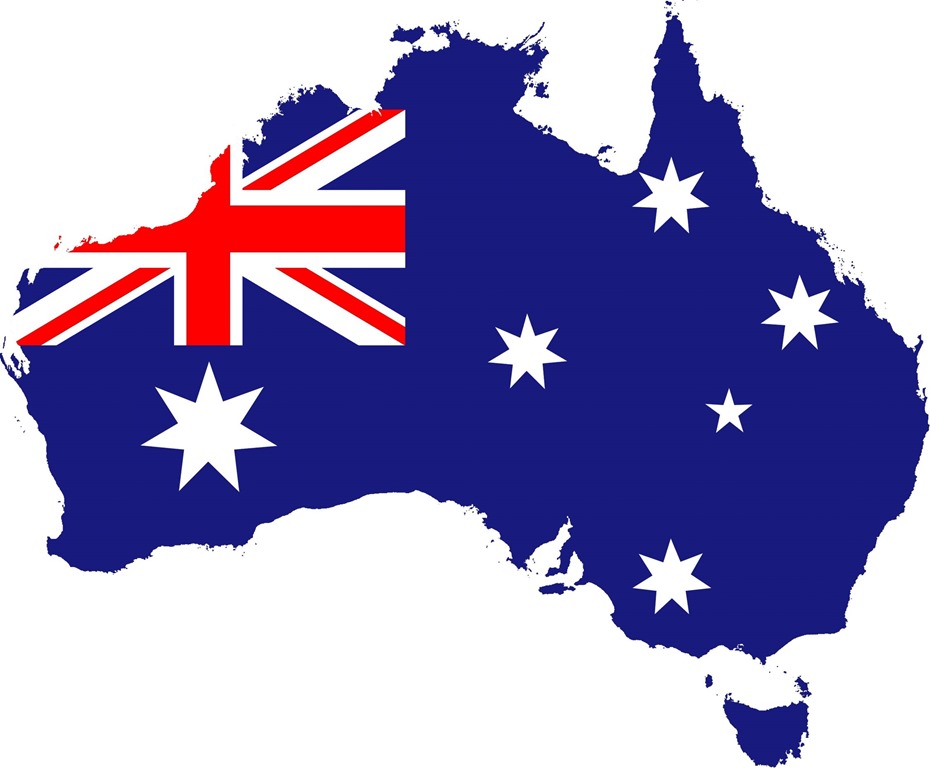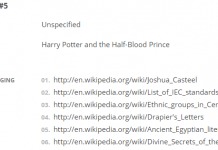 Remember that Australian government committee report suggesting Australia should relax restrictions on parallel importation, implement a US-style “fair use” exception, and drastically shorten copyright terms? We already covered an Australian government official insisting the government wasn’t interested in shortening copyright terms. Now Publishing Perspectives has an interview with Australian book industry insider Andrea Hanke which suggests that things will remain business-as-usual in Australia, regardless of the content of the report.
Remember that Australian government committee report suggesting Australia should relax restrictions on parallel importation, implement a US-style “fair use” exception, and drastically shorten copyright terms? We already covered an Australian government official insisting the government wasn’t interested in shortening copyright terms. Now Publishing Perspectives has an interview with Australian book industry insider Andrea Hanke which suggests that things will remain business-as-usual in Australia, regardless of the content of the report.
Hanke sees the parallel importation restrictions as being the most significant part of the discussion, given that long copyright terms are effectively locked in by treaty. She explains:
The government remains firm in its commitment to repeal parallel importation restrictions (PIRs) but the Arts Minister Mitch Fifield recently said they don’t have a specific timeframe for their removal and want to consult with the industry on “transitional arrangements.”
The Labor party, which is in opposition (and you’re probably aware that we’ve got an election coming up in July), has indicated that they’re unlikely to repeal PIRs.
She notes that the current Australian government “has a free-market agenda and believes that territorial restrictions are a barrier to lower prices.” She also points out that this is not the first time PIRs have been a bone of contention; a government commission previously recommended removing them in 2009 but at that time the government decided to keep them.
Henke adds that the Australian book industry by and large believes parallel import restrictions are a good thing, and will point to ways that an open market has harmed the New Zealand publishing industry. Even Australian bookstore groups, such as the Australian Booksellers Association, are campaigning against PIR repeal.
So, will the recommendations from this report meet the same fate as similar recommendations from prior reports? It seems likely. When moneyed interests have a vested interest in making sure things stay the way they are, things usually do stay the way they are.
That said, I do have a bone to pick with this paragraph. Porter Anderson writes:
The fundamental bone of contention arises in the Productivity Commission’s overview material that reads, “Australia’s IP (intellectual property) system is out of kilter, favoring rights-holders over users and does not align with how people use IP in the modern era.” Most proponents of copyright will be quick to point out that rights-holders are, yes, precisely the parties that should be favored by copyright protections.
Actually, they’re not. The entire purpose of modern copyright—at least as set forth in the US Constitution; I can’t speak for Australia per se but if theirs is based on the same principles that inspired the US version it should be similar—is to benefit the general public, not rights-holders—except insofar as the general public interest can be advanced by providing some benefits to rights-holders. If it comes down to a conflict between the interests of rights-holders and the interests of the general public, it’s the general public that is supposed to win out. Every time someone claims that “rights-holders are […] precisely the parties that should be favored by copyright protections,” I cringe.
It remains to be seen whether Australia will loosen copyright and importation restrictions. Meanwhile, when I spot-checked a few Kindle titles on Amazon.com.au vs. Amazon.com, I found the Australian prices for e-books were more or less equivalent to or cheaper than the US prices when I ran a currency conversion. (In some cases, such as Alliance of Equals, the only version of the book available on the Australian site was the Audible audiobook, which seems strange—but then, anyone who really wants the e-book in Australia can order it direct from Baen.) So perhaps this is mainly a matter of concern to printed-book sellers down there after all.

































When you account for ‘conversion’ isn’t really fair though. It doesn’t matter what you the American with the better dollar would pay. A local earns local dollars and pays local currency. A high list price, for them, is still objectively high.
Quotes: “If it comes down to a conflict between the interests of rights-holders and the interests of the general public, it’s the general public that is supposed to win out. ”
No, no, no. A strange statement, to say the least. You’d reduce rights-holder to a mere renter subject to a landlord and pretend what you want is what the public wants. There’s no public to say X years. Surveyed, the public would be all over the place.
The idea that there’s a “general will” (your public) that overrides all else is thought by many scholars to be the roots of totalitarianism. A mythical “general public” whether Germanic in the Nazi formulation or the working class in the communist version, can ride roughshod over all others. In the communist variety, what’s taken is literal property, not all that different from intellectual property. In short, that sort of chatter isn’t good.
It’s actually the copyright or patent holder that’s in control constitutionally. He or she decides how long a copyright term should be to justify the labor of writing of inventing. Make it too short, and they don’t bother which is then constitutionally too short. And even the most causal inspection of today’s authorly incomes suggests that a long copyright is needed for them to be adequately compensated. Some will need to write to put their grandkids through college.
—–
Besides, it’s in the public interest to ensure that quality editions remain in print and often that means copyrighted. Check out a lot of the overpriced, public domain print replica books that Amazon not only sells but often pushes to the top of search results to increase its income. Entering the public domain often means a book gets abused.
I tend to find something sleazy about those who push for ever shorter copyright terms. Some are the book equivalent of welfare bums, merely wanting something for free. Others would have authorship return to the era when our constitution was written, one when authoring was almost entirely the domain of those who were independently wealthy.
Longer copyrights are certainly abused by Disney, that is if you think Mickey Mouse matters. But they also keep many author or their spouses alive in their old age. Perhaps a better description of the mindset behind some of the short terms is “Screw you when you’re old and feeble. I’m cheap and want my books free.”
It’s also stupid. For print, the copyright portion of the price, meaning what the author gets in royalities, is typically only 10-15%. And keeping a book in print, under copyright, and published by one publisher may actually mean that publisher gets enough volume sales to keep the price low. Generated a dozen public domain versions, and they’re all likely to be poorly done and not particularly cheap.
My version of this book is actually copyrighted to some extent, due to to all the additional material I’ve added:
https://www.amazon.com/Theism-Humanism-Book-Influenced-Lewis/dp/1587420058
I have the best version and thus the most sales, so I can price it lower. Check Amazon and you’ll find a number of cheap replicas, all of which cost more.
—
One final note. If you like an author, you should want to give him money to reward what he’s doing for you. Not paying is like not tiping for good service in a good restaurant.
–Michael W. Perry, Inkling Books
Personally, I don’t want copyright terms any shorter than the ones this country was founded with. If it was good enough for the Founding Fathers, it’s good enough for me!
(It’s so weird people are hung up on insisting that the Second Amendment be honored exactly as it was meant in the Founders’ time, but we don’t see anyone clamoring to have the same observance for copyright.)
To note, the Copyright Clause reads, “To promote the Progress of Science and useful Arts, by securing for limited Times to Authors and Inventors the exclusive Right to their respective Writings and Discoveries.”
“To promote the Progress of Science and useful Arts.” Not “To make sure that creators are compensated for their works.” The purpose of copyright is to advance science and technology (“useful arts”). Any other concerns, such as whether and how much creators get compensated, is secondary to that goal. It’s a thing they do in the interest of achieving that goal, not the goal itself.
Oops, Alliance of Equals hasn’t been published yet (5 Jul 2016) and Baen mostly hasn’t figured out how to do preorders on ebooks (except if you buy the monthly bundle).
So no Kindle store yet has this ebook.
Try looking at Dragon in Exile (Liaden Universe Book 18) mmpb by Sharon Lee and Steve Miller.
There is also an international comparison problem. US prices exclude sales taxes, UK and other Euro prices include tax, Australian prices I don’t know but might include GST.